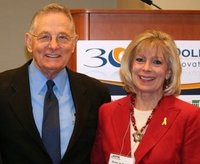Why bipartisanship matters

In December 2010, I was thrilled to thank Senator Birch Bayh personally for his role in bipartisan legislation that passed in 1980 and has since resulted in saving millions of lives.
photo by Alex de Parry
History is replete with examples of bipartisanship that have had long-lasting, positive effects. A look at just one can teach us the critical need for bipartisanship in matters that relate to cancer and other health conditions.
Have you or a loved one taken Tamoxifen or Herceptin for breast cancer? How about Revlimid for multiple myeloma? Bexxar for non-Hodgkin lymphoma? Gleevec for chronic myelogenous leukemia? Did Neulasta ever keep you safe from infection while undergoing chemotherapy?
Then you have benefited from bipartisanship, because these and nearly 200 other drugs are available today as a result of the 96th Congress passing a little-known bill that laid the foundation for the development of therapies that have saved — literally — millions of lives, including mine and perhaps yours or that of someone you know or love. That bill became known as the Bayh-Dole Act.
Prior to its passage, the government retained the rights to federally-funded discoveries. Then, as now, the federal government was the largest single source of funds for basic research because basic research is generally too risky and too expensive for private industry to undertake alone.
But by retaining the rights to federally funded discoveries, taxpayers got no return on their investment because government is not in the business of turning discoveries into products that benefit people. That's up to private industry, but private industry couldn't commercialize discoveries to which they had no rights. As a result, discoveries languished as pieces of paper — i.e., patents — in government offices.
The Bayh-Dole Act unlocked those discoveries that were made with taxpayer money. It allowed businesses and nonprofits, such as universities, to retain title to their inventions that were made with federal funds and to license them to private companies for commercialization.
It was a brilliant piece of legislation that set the stage for commercializing hundreds of products, including life-saving treatments to which many of us cancer survivors owe our lives. As an added benefit, the Act has stimulated the formation of more than 5,000 companies and created hundreds of thousands of jobs since its passage.
The Bayh-Dole Act wound its way through Congress in 1980. Conservatism was sweeping the country. President Jimmy Carter was unpopular. Ronald Reagan won by a landslide.
Yet in that political climate, the bill passed in the lame duck session, and President Carter signed it into law on Dec. 12, 1980 — less than a year after it was introduced!
The bill was sponsored by Indiana Democrat Birch Bayh and North Carolina Republican Bob Dole. It was co-sponsored by several others, including arch-liberal George McGovern and arch-conservative Strom Thurmond.
Despite polar opposite ideological views of the sponsors and co-sponsors and the fight for control of both houses of Congress in 1980, members of Congress set aside their differences and worked collaboratively to move this important piece of legislation forward.
Could this be done today, with partisanship on steroids? I wonder. Complex issues are spun into 30-second sound bytes and 140 characters. Compromise and collaboration are dirty words. Politicians put their own agendas ahead of ours and elections have become more about defeating the prevailing party than about solving the real issues that affect you and me.
If the 96th Congress had behaved the way some members of the current Congress — and many who wish to be in Congress — are behaving, it's unlikely that many of us would be alive today because they simply wouldn't have found common ground and passed legislation that paved the way for life-saving treatments. Instead, common sense prevailed in even the most conservative and liberal members, and as a result, lives have been saved and jobs created.
Sadly, such bipartisanship has become a thing of the past, but the 96th Congress proves that it is possible and the Bayh-Dole Act exemplifies why it matters.
There's no doubt that our country faces a myriad of complex issues. As a national health concern, cancer is only one of them, and there is an immediate and pressing issue: major funding cuts for cancer research are looming. If allowed to take effect, progress will slow and that will cost lives, not to mention jobs. Is that what anyone wants?
I certainly hope not, but that's exactly what we'll get if Congress doesn't act quickly to solve the problem. And that's going to require bipartisanship that's unlikely to be mustered if we choose to elect or re-elect politicians who are unwilling to collaborate with the other party regardless of human cost.
When the elections are over, I can only hope that they don't result in more polarization. There are too many issues that we all want solved, but they won't be solved by short-sighted obstructionists or extremists who have hijacked Washington and gripped it in gridlock. It will take more moderate representatives who are willing to collaborate with their colleagues regardless of party affiliation — who are willing to represent us, the people.
When we cast our votes next week, let's take a deep breath, tune out the noise, nonsense and nastiness that has marked this election, and vote wisely. Let's demand that Congress return to collaboration and common sense. It's the only way that solutions are ever found. And too much is at stake to settle for less.
Betsy de Parry is the author of Adventures In Cancer Land. Find her on Facebook or email her.

